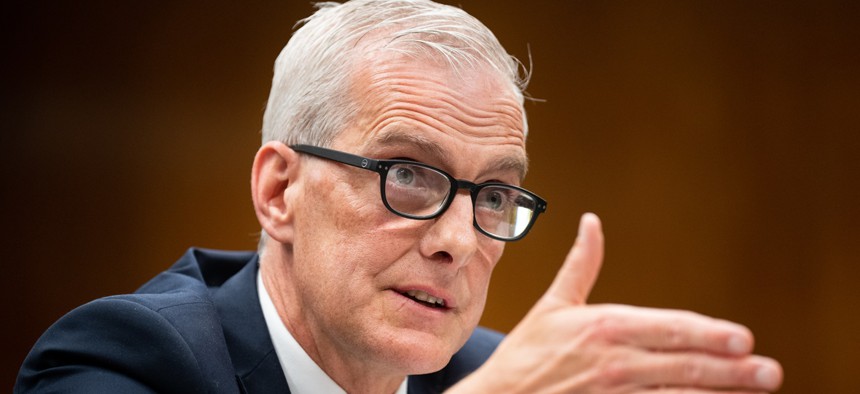VA cautiously optimistic that ‘very positive’ March EHR rollout shows reset is working

Secretary of Veterans Affairs Denis McDonough testifies during the Senate Appropriations - Subcommittee on Military Construction, Veterans Affairs, and Related Agencies hearing to examine budget requests for the Department of Veterans Affairs. Bill Clark/CQ-Roll Call, Inc via Getty Images
VA Secretary Denis McDonough said the department plans to restart deployments of its new health records system in FY25.
Feedback from the Department of Veterans Affairs’ most recent deployment of its new Oracle Cerner electronic health record system continues to be positive as the department looks to restart additional rollouts of the new software in the coming fiscal year, VA Secretary Denis McDonough said on Tuesday.
Last month, VA and the Department of Defense jointly implemented the EHR system at the Captain James A. Lovell Federal Health Care Center in North Chicago, Illinois. VA and DOD have been deploying interoperable Oracle Cerner software as part of a modernization program to ensure that servicemembers’ health records can easily transition from active service back to civilian life.
While the March deployment at Lovell marked the final system rollout for DOD’s transition, VA has continued to experience challenges with deploying its new system. After a series of technical and performance issues, patient safety concerns and critical watchdog reports at the VA facilities using the Oracle Cerner system, the agency announced in April 2023 that — with the exception of Lovell — it was pausing all future deployments as part of a “program reset” to address problems with the software.
VA officials have pointed to the deployment at Lovell as a key test of its reset efforts, given the large size of the facility and the potential for it to inform future rollouts of the EHR system. The Oracle Cerner software has been implemented at a total of six VA medical facilities since VA began deploying the system in 2020.
During a House Appropriations Subcommittee on Military Construction and Veterans Affairs hearing on Tuesday, McDonough said VA’s rollout at Lovell “has been successful so far” and that the feedback was “very positive.”
“One measure of success there is the speed with which we've returned to a higher level of pre-deployment appointments for veterans,” he said. “So, overall, that deployment has been on the high level of expectations.”
McDonough also noted that an increase in on-site personnel and enhanced training for clinicians and providers “made a considerable difference” when it came to successfully using the new software. But he cautioned that positive feedback in the first few months of a new EHR system’s go-live has not always been indicative of success and that the department plans “to take this very seriously.”
Despite the ongoing reset phase and pushback from some lawmakers over the long-term viability of the system, Rep. John Carter, R-Texas — the panel’s chairman — said “the subcommittee continues to support [the] VA-DOD electronic health records management system.”
Carter added that he was disappointed that the department’s recent funding request for the EHR system’s rollout is a significant decrease from the FY24 budget, noting that it represents “a cut of approximately 50%.”
The Biden administration’s FY25 budget proposal for VA allocates $894 million for the EHR modernization program and does not include any funding for future deployments of the Oracle Cerner system.
McDonough previously told members of the House Veterans’ Affairs Committee last week that the department was planning to restart deployments of the new EHR system before the end of FY25. He also said that VA had “prior year appropriated money” that it could use for rolling out the EHR system at new sites, in addition to the amount listed in the recent budget request.
McDonough reiterated both points during Tuesday’s hearing, saying that “before the end of this fiscal year, we'll be in serious discussions about going live more broadly” and that VA “will use prior year funding” to finance the deployments.
Through the first five deployments preceding the Lovell rollout, McDonough said VA “didn't do a good enough job” of earning the support of its clinical workforce and was “working really hard to get that trust back” during the reset period.
He also noted that the positive go-live at Lovell occurred “the same time as we were experiencing challenges associated with Change Healthcare,” a subsidiary of UnitedHealth Group. The company announced in February that it had been the victim of a ransomware attack, which had a financial impact on 94% of U.S. hospitals, according to a survey conducted by the American Hospital Association.
McDonough said, however, that the department was not able to fully determine whether recent issues it experienced were related to the attack or to issues with the EHR software.
“It's hard to discern, you know, some of our concerns about, for example, the pharmacy function in our record and how much of that is a reflection of Change Healthcare, and the interoperability of that system with ours now, and how much of that is the new system,” he said






